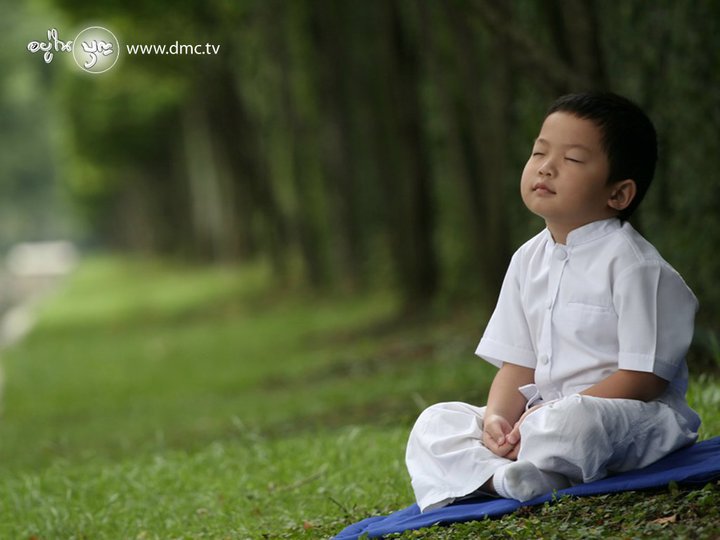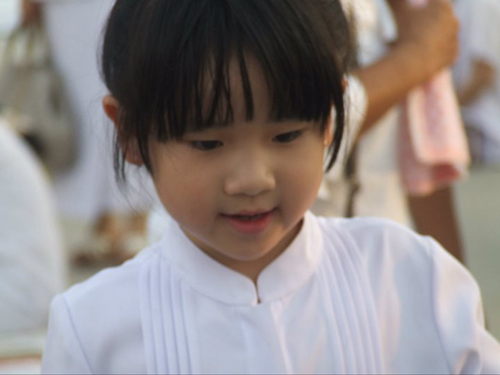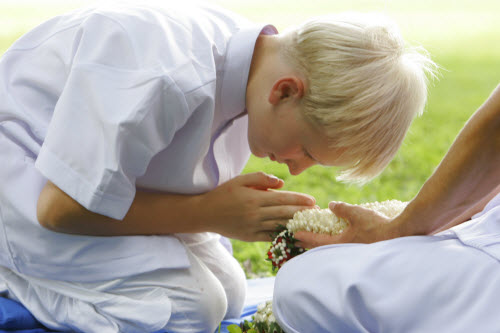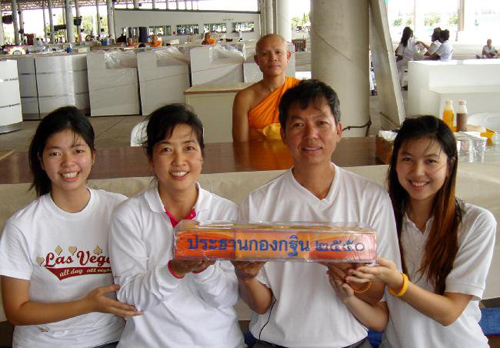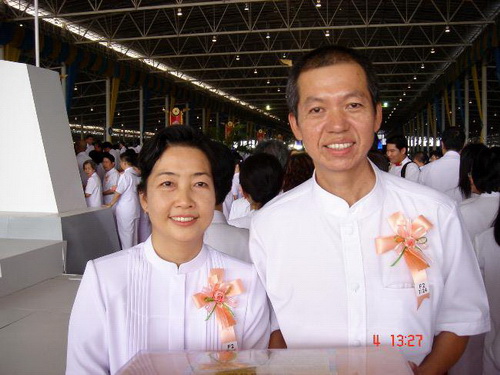Blessing Twelve:
Raising our childrenB. THE COMPONENTS OF GOOD UPBRINGING
‘Would be’ parents must prepare themselves, both in worldly and spiritual ways so they are ready to bring a good child into the world and bring him up to be a good person. The parent needs to prepare themselves for three different stages bringing a good child into the world:1. before conception
2. from conception to birth
3. from birth to adulthoodThe task is not easy — really it can be considered a full-time job — but the benefits of success will be the lifelong pride of the parents.As already mentioned, ‘good child’ from the parents’ point of view, covers abroad range of meanings: in brief, possessing all sorts of virtues, good physique and sound mind. However, it is hard to find a person perfect in every sense of the word. Generally, a child held to be good, will have three qualities; they will be brainy; well-behaved (i.e. be able to follow the Precepts), and good hearted (i.e. generous and compassionate). These are the basis of a child’s virtue. Any other goodness in which the parent can train their child, are all well and good and will add to the parents’ pride in their child.B.1 Before Conception
The parent must be both physically and mentally prepared to bring a good child into the world. For Buddhists, physical preparation alone is not sufficient because our human being consists not only of a body, but also of a mind: necessitating careful spiritual preparation for parents. The knowledge which Buddhism gives to ‘would be’ parents goes far beyond the frontiers of even modern medical science. According to Buddhist Teachings, each and every creature has their own individual kamma (i.e. storehouse of potential results of good and bad deeds performed in the past). According to the Buddhist proverb (S.i.227):Yādisaṃ vappate bījaṃ
Tādisaṃ harate phalaṃ
Kalyāṇakārī kalyāṇaṃ
Pāpakārī ca pāpakaṃOne reaps the fruit from the (type of) seed one sows: lovely out comes from lovely actions, ugly outcomes from ugly actions.Buddhist teachings also show that those who have done good deeds will be reborn in heaven after dying from the human realm, and when he is reborn in the human realm, he will be born to wealthy and morally proper parents. A person, who has performed a lesser amount of merit, when being reborn into the human realm, will be born to a less wealthy or even poor family, according to the degree of his merit. The being always carries its past merits with it, even between births, and this merit has a determining effect on who its next parents will be. A being awaiting rebirth into the human realm will be born to parents with a level of merit equal to its own. It cannot be born to parents whose merit is greater or less than its own. Therefore, in order to bring a child into the world that is good, a ‘would be’ parent must perform as many meritorious deeds as possible, by making donations, keeping the Five Precepts and, most importantly, by meditating regularly. The result of such meritorious action will be to attract a being with a good level of merit to be born into their family. By these very actions, a ‘would be’ parent prepares themselves spiritually, ready to be a good father or mother — pure in body, speech and mind, beautified by the wisdom of meditation and ready to welcome the birth of a child perfect in personality and Dhamma.In the time of Luang Phaw Wat Paknam, there was a merchant who came to Luang Phaw Wat Paknam complaining that for many years he had being trying to have a child without success. Luang Phaw Wat Paknam asked him what sort of child he wanted. He said he wanted a good and virtuous child who was rich. He wanted a handsome child too. Luang Phaw Wat Paknam said that whatever you want your child to turn out like you have to make yourself as good as you want your child to be first — like a blueprint. Then he meditated to see which angel was about to run out of subtle merit (and die from heaven) who had those sort of characteristics and would suggest which mother and father had a matching level of merit to be their new parents. If soldiers wanted a brave child then Luang Phaw Wat Paknam would give them the same advice to make themselves brave first of all.Some people might wonder why in some cases good children seem to be born to parents who are horrible and cruel and why good parents sometimes have horrible children or idiots. Such cases don’t mean that the Law of Karma has its exceptions, but first we must understand all of the causes and effects coming into play. It is like breaking through the net.Supposing there is the case that a certain mother and father are good but they have an awful child. The circumstances for the birth might go something like this . . . supposing on the father’s birthday all his friends assemble at his house to wish him a happy birthday. He thinks, “When in Rome you must do as do the Romans”. Usually he never touches alcohol but on this occasion he makes an exception and opens a bottle of wine for all his friends. As the host he feels compelled to take the first sip of wine before passing the bottle on to his friends. A second sip follows the first and before long he feels slightly drunk (because he is not used to it). It happens that that very night is the night that he conceives a child. At the time both parents happen to be drunk, a being seeking to be born, a being with the karma of drunkenness in the past, finds just the right pair. Into the womb it goes and the (usually) good couple get themselves a baby that is going to grow up with the habits of a drunkard. The moral of the story is, if you do good deeds, do good deeds consistently and don’t open the opportunity to mistakes. Thus for a couple who have been good the whole of their lives but slip up for a single day, they might have to spend the rest of their lives bringing up a mentally handicapped child or a child that is mute.On the other hand there may be really terrible parents that have a good child. In Thailand of course there are some of the worst robbers and murderers. However, before they go out to do their duty they will always ask for the blessing from the Triple Gem so that they can do their duty in safety. When they have accomplished their crime, again they ask the blessing of the Triple Gem to protect them from the police. In their wicked heart, there is still a glimmer of goodness. Sometimes, especially in a Buddhist country, although they are thinking of evil almost the whole of the time, because the environment is an amenable one, there will be things to remind them of virtue from time to time (e.g. when they see a monk passing by, or there are sermons broadcast on the radio and TV). Thus sometimes when there is something to kindle the glimmer of goodness to a glow in heart of a mother and father who are usually never interested in such things then there is a slight possibility that they may conceive a virtuous child. However the chance is really remote — not enough to pin your hopes on.B.2 From Conception to Birth
Even two thousand five hundred years ago, the Lord Buddha’s own mother, Queen Mahāmāyā knew how to take painstaking care of both her physical and spiritual well-being while she was with child. The queen ate only agreeable foods and frequented the harmony of the natural environment as she came close to the time of childbirth. Queen Māyā also maintained purity and stillness of mind throughout pregnancy by keeping the Eight Precepts and meditating. It seems that for Buddhists, care of the child since conception is an implicit part of the ‘art of motherhood’, re-iterated anew in the present day when medical science is catching up with ancient knowhow...and seemingly coming to the same conclusions...The mother who keeps the fifth of the five precepts will not worry that her child be under weight or handicapped at birth because refraining from alcohol, intoxicating drugs and cigarettes cuts out a significant proportion of the risk in this respect. Even medicine taken by the mother, may have side effects for the unborn child, and medicines taken should therefore only be those prescribed by the family doctor.Consideration of physical health alone is not sufficient — the mother needs to be spiritually healthy too, so that the child to be born is perfect in mind as well as body. Modern medical science has shown that the embryo is sensitive to its mother’s moods and emotions. Indeed, during the time of being carried in the womb, the child is in the process of character formation. The art of having a good child is acknowledged these days, not to be merely a matter of genetic engineering, but of the suitability of the intra-uterine environment created by the mother during pregnancy; it is the key to raising one’s children from the time of conception.For this reason, the pregnant mother, the mother should attempt to keep her mind calm, undisturbed, stable and cheerful during the time of pregnancy. There is no end to the practical ways in which the mother can help the character of the child in the womb. While she is carrying the child, the mother should imagine pictures of how she would like her child to turn out. She should speak and sing lullabies to the child in her womb. She shouldn’t worry whether the child can hear or not, but bear in mind that if the child is at ease when he hears the mother’s voice, this influence will carry across to the time when the child is born. If the pregnant mother is at ease when she hears the word ’Sammā-arahaṃ’, the baby, when it is born, will immediately be at ease whenever it hears the words ‘Sammā-arahaṃ’. The mother should be a teacher to the baby she is carrying: a teacher of meditation. Just by creating, the mood of centeredness and peace for the child, when he closes his eyes inside the mother’s womb, he will see not darkness but the brightness inside himself — the brightness of the virtue of his own two parents.There are certain things which the pregnant mother should avoid too. Just as good experiences by the mother can have a good effect on the child, during pregnancy, if there is any adverse influence on the mother’s mind, the embryo will be adversely affected. If a child is born into the womb of a mother who often quarrels, the child who is born is likely to be morose and uncheerful by nature.Thus, if the mother finds stressful conditions at work, or has other traumatic experiences, the child will be highly strung. Better then, for the mother to take maternal leave from work during her pregnancy Very negative thoughts by the mother, especially by those mothers who have contemplated abortion, are picked up by the child and may cause the child to have an instinctive distrust or fear of his mother throughout their life.Better then, that the mother meditates every day, perform chanting, give alms and listen to sermons. The child whose mother is positive thinking and cheerful during pregnancy, is likely to be cheerful and positive thinking like her. Parents, who make great self sacrifices, careful and wise in the support of their child during pregnancy, will gain a child who is an altruist, thorough and wise. The care taken by the mother during pregnancy will be transformed by the child into love and respect for his parents, a readiness to go on to the next stage of his development that will come after his delivery.Even the attitude of the father has an influence on the well-being of the baby in the womb of his wife. The father will have to work harder when his wife is pregnant, helping her with the heavy work she would normally do herself and being careful not to create situations that are going to irritate or upset the serenity of the mother. Even if normally he might bring the tensions and stresses of his work back home with him, now he must start to be more careful to leave his work in the office and not bring the chaos of his work home with him.B.3 From Birth to Adulthood
There are five duties for the parent in bringing up their children from the time the child is born to the time he is old enough to look after himself (D.iii.180):1. Not allowing your child to do anything evil
2. Teach your child to be established in virtue
3. See that your child is educated
4. Arrange your child’s marriage
5. Pass on your legacy to your childFor all five of these parental duties (especially establishing the child in virtue) it is absolutely necessary that the parents have the following four qualities:
1. the ability to distinguish themselves between good and evil — i.e. they should be established in Right View.
2. patience
3. ability to recognize the characteristics of False Friends and Good Friends
4. self-disciplineIf potential parents lack these prerequisites, perhaps they should wait until they manage to develop them before considering to have children.B.3.1 Not allowing their child to succumb to wickedness
Not allowing your child to succumb to wickedness means to prevent your child exhibiting any of the sixteen traits already mentioned in the first blessing for “false friends”. Whether a child grows up into a fool or a wise one depends on their teacher and their environment. The first and most immediate environment to the child is the parents themselves. So here are some practical tips for how to prevent you child from doing evil:
1. Set a good example: Thus the first thing you must do to teach your child to do no evil is not to say or do anything evil in front of your children. Hypocritical behaviour in front of your children will ruin their upbringing. Parents drink alcohol and smoke in front of their children and even send their children to buy liquor and cigarettes. They explain to the child “don’t drink or smoke when you grow up — its bad for you!”, but they think they themselves are too old to change and therefore don’t even attempt to set an example. Such a lesson is of no value to the child. Even parents who teach their children to lie will suffer in the end because the parent will become a victim of their own insincerity.
2. Keep devices for evil-doing out of the house: You need to make sure the environment in the house is one which doesn’t encourage evil, you should make sure that you don’t allow equipment for doing evil into the house right from the time your first child is born objects such liquor bottles, wine brewing kits, gambling tables or pornographic materials should be cleared out of the house and no further such things allowed to enter into the house any more.
3. Help choose your child’s friends: Parents need to have a close relationship with both their child and his friends. This is to make sure that your child is not associating with friends who are going to influence him in a damaging way. Here are two suggestions which may be useful in this respect:
1) Regular tea parties for a child and their friends: child and his friends to come to play once a week. It may be extra work to prepare cakes for all those friends but while the friends are tucking in to their tea, the parents will learn enough about the character of the friends from the things they say to advise their child which friends to associate with.
2) At least one communal family meal per day: There should be at least one meal a day when all the family come together — maybe the evening meal — to give the chance for the parents to notice any signs of guilt on a child’s face. The first time the child does something wrong (such as lying, smoking or shoplifting), the guilt will be very noticeable, the second and subsequent times, less and less noticeable, until in the end there is no guilt. If the family are all together once day each day, then the parent can correct a child’s behaviour while it is still fresh in the child’s mind. If your child plays with friends who are evil, then he will absorb those habits as his own such as swearwords or unattractive slang. On a wider scale, bad friends may bring ruin to the family, as illustrated by the story of a chameleon playmate betraying an iguana tribe in the Godha Jātaka (see @C.4 below).
4. Dare to discipline: For children who have done a lot of good deeds in the past, you will not have to give very many suggestions or spend too much time correcting their behaviour. Some children seem to know instinctively what is right and what is wrong and always keep themselves on the straight and narrow. For some children, being told off a single time will be enough to keep them from doing something evil all their life. However, there are some children who take no notice however many times they are warned. If after sufficient criticism and reasoning the child is still stubborn or unresponsive or tries to see how far they can “try it on” with their parents’ authority, they may need to be beaten. If they are not beaten they may be spoiled for the rest of their lives. Parents who need to punish their children must give serious consideration to what long term effects the punishment will have on the child. The long term aim in educating a child to avoid evil is to build up shame of doing evil [hiri] and fear of the consequences of evil [ottappa]. Many cultures think that beating a child is a necessary part of a child’s education (viz. the English proverb “Spare the rod and spoil the child” — see @C.2 Tilamuṭṭhi Jātaka below), however, to beat a child, especially out of anger, teaches a child only to fear the parent or fear the stick, rather than fearing evil. Besides undermining parent child relationships, as the child grows bigger and stronger, the parent will be less and less able to control the child’s behaviour by force. The objective parents should have in punishing a child is to shame the child from doing such an evil thing again.B.3.2 Teach your Child to be Established in Virtue
The first “good friends” to each and every one of us in the world are our parents or guardians — they are the ones to instill the virtue of “being a teacher to yourself” [yonisomanasikāra] in a child — and each parent must take responsibility for such a duty — from the time their child first opens their eyes to the world onwards. There is ample medical and psychological evidence to suggest that every individual is impressionable right from the time of being a baby — for example a baby whose nappy is left unchanged regularly and soiled for long period of time is liable later in life to unhygienic and messy habits.Thus parents should not be neglectful in setting up the sort of habits they would like to see in their children — as for higher virtues— the importance is proportionally greater — you cannot just wait for teachers or schools to do the job for you — they will never be able to give full attention to the task because their students are many and the time for each is limited — and what’s more a children’s time spent at school is still less than the time spent at home.For all of these reasons — the instilling of virtue in children is an important duty for the parents — right from the time the child is still a baby. It is a duty which requires perseverance and consistency and requires an understanding or sequencing and graduation in virtues taught to know what to teach a child first and what to keep until they are older. Just as mentioned for “preventing your child from doing evil”, the parents can influence the child in a positive ways by:
1. Setting a good example to your child: parents should show their generosity, do chanting etc. in front of their child and be seen by their children to take an interest in reading books on beneficial subjects.
2. Choosing good friends for your child: It may seem trivial or overzealous to worry about so many aspects of a child’s environment and development. However, it should be pointed out that a child left to his own devices has a very slim chance of developing into a well-balanced adult. Just as a child left alone will choose junk food or convenience food rather than nutritious food and grows up physically weak, a child left to choose its own sources of knowledge with out any guidelines will develop a flawed character. Thus, every child who grows up with a genuine respect for the Precepts and meditation together with a generous heart, does so only as the result of unflagging enthusiasm by his parents for instilling the value of Dhamma practice.Of course the possible virtues you can teach to a child are many, but the most important in the development of “being a teacher to yourself” are:
1. Knowledge of the highest aim of Buddhism (the highest aim in life of humankind). Buddhism teaches us to pursue perfection – when our perfections are fulfilled we will be able to overcome the last of the defilements in our minds – and we will be able to break free from the cycle of rebirth.
2. Knowledge of how to practice in order to achieve our highest aim in life: normally the threefold practice of self-discipline [sīla], meditation [samādhi] and wisdom [paññā].
3. The four virtues for a householder: [gharavāsadhamma]: 1. truthfulness [sacca]; 2. training oneself [dama]; 3. patience [khanti], and; 4. selfsacrifice [cāga].
4. Supporting their religion: That Buddhists have the job of supporting their religion: Because man’s highest refuge is the Triple Gem, it means that care should be taken to support the Saṅgha or monastic community who perpetuate and spread Buddhism. If any monastic member is deprived of the support of householders — before long he will be unable to continue in his duties – and in turn that is the end of the life of Buddhism — in other words it is the job of Buddhists to support their religion.
5. The Maṅgala Sutta: Principles in keeping with (especially the first six) blessings of the Maṅgala Sutta:
1) not associating with fools: mother and father must teach children how to choose appropriate friends and spouse;
2) associating with the wise: i.e. those who are adept in self-discipline [sīla], meditation [samādhi] and wisdom [paññā];
3) honouring those worthy of respect: especially the Buddha, monks who practice well, monarchs established in the Ten Virtues of a Monarch, parents and elder relatives and various teachers — even ones boss if he is honest. Having respect for such people means attempting to follow the good example set by such people.
4) Living in an amenable location: an unpolluted environment with good prospects for work and education both in worldly and spiritual ways — and even government — not somewhere dominated criminal underworld.
5) Get down to the pursuit of the Perfections. Our work in the present time will bring its fruits in the future. In the same way the happiness we receive in the present must be the result of our pursuit of perfection in the past, the merits we accrue will bring fruits ensuring our intelligence, prosperity and progress in our duties in the future — and happiness in life in accordance with the Buddhist proverb:The accrual of merit brings happiness (Dh.33) and Merit is the refuge of beings in the world to come (J.iv.62)Furthermore, the faith of those who are steadfast the accrual of merit will be a shield to protect them from the temptation of evil ways.6) Setting oneself up properly in life: especially having the correct aim in life.Anyone who has accumulated all the foregoing virtues will be sure to have developed the ability to be a teacher to themselves — with the flexibility to adopt appropriate to any circumstances – and will be able to earn their living successfully — life is happy and such a person has worth to society.Apart from the virtues mentioned above, parents should be ultra-critical of table manners, sleeping habits (especially fixing bedtime) and working habits (especially working hours) — because these are all fundamental ways of developing self-discipline. Without the parent’s prodding, you can be certain that self-discipline will not develop by accident. A child should also be expected to make a contribution to the work of the household since they are small if they are waited upon hand and foot and have too much time on their hands, in the end the child may be unable to help themselves.B.3.3 Giving your child an education
Education is the gateway to knowledge and wisdom for your child. If a child has the chance for a full education, then success will follow on in later life. Thus parents should instill in their children the love of education and reading by:1. choosing good books for your child: The same thing goes for books which the children should read. Of course the books most suitable for the child to read are the ones that children are too lazy to read. Children would usually like to read any sort of book of cartoons or book with no serious content instead. It is up to parents therefore, to find ways to make useful books interesting to their children, such as getting the children to read such books aloud to their parents.
2. choosing good teachers for your child: means taking your child to study with monks or masters of secular subjects. Parents can also help their children by finding a good school for their children and special tuition.Children might also need their parent’s help in learning how to split their time between study and play. In study time children should study hard: in free time, play hard. The problem with children’s education is that all parents would like their children to be top of the class. They want their children to be accepted into the best school. Whether the child lives up to these expectations does not depend on their parent’s wishes however, but on two important factors the child’s past merits (gifted and wise from birth) and his environment. The parents have their strongest influence on the second factor. In any case the parents shouldn’t expect too much from their child. Don’t forget that childhood is short. Children cannot live by education alone; they must have time to play and need to have all sorts of experience of life, society and community in order to fully develop their capabilities. Children should have the chance to develop in all areas. If children do well in their studies they deserve praise from their parents. If children don’t meet with much success in their studies, even though they have tried hard, there is no need to punish them or compare them with other children who have got better marks because it will undermine a child’s self confidence. No matter what result the child gets, parents should be proud of their children for their diligence at the very least. The parents should notice if their child is gifted in any particular way or has any special interest art, music or sports for example. Parents should support their children in the things that take their interest in order to lead them to success and even if they aren’t the best of students they will still be able to find happiness in life.Having provided worldly knowledge for their child, parents must complement it with knowledge of Dhamma. Where worldly knowledge looks after the body, knowledge of Dhamma cares for the mind. Dhamma, the food of the mind, helps to make children resilient towards problems and obstacles, never ‘chickening-out’ or bored by their own tasks. Dhamma brightens children’s minds giving them faith to develop their own virtue without end. Parents should introduce the Five Precepts to their children from an early age. Children should check for themselves each day whether their Precepts are intact or not, point by point. Apart from keeping the Precepts parents should encourage their children to study Dhamma literature, be generous, perform chanting and meditate on a regular basis. Every good son should also have the chance to ordain as a novice or a monk at some time during his education in order to have first hand experience of the ideal Buddhist culture. Parents should always take the role of pointing out the applications of Dhamma knowledge in its connection with everyday life.B.3.4 Approving an appropriate marriage partner
As if giving all manner of basic needs and education is not enough, children even expect parents to give free consultation when in doubt about who to marry. When one’s children are fully educated and are well established in their careers, if they wish to marry, then parents have two important duties firstly to finance their children’s marriage and secondly to advise and take the final decision in their children’s choice of spouse. Really who your child marries is not the important issue — it is whether they have the sixteen qualities of a “good friend” (see Blessing Two) upon which to build their own family. In fact, if as a parent, you can persuade your child not to marry, you will be doing them the biggest favour of all because at best the happiness of married life is only miniscule compared with all the suffering family life brings. One’s opportunity to do good deeds is seriously curtailed by one’s marriage.The latter role of the parents is seen as an unnecessary intervention by many modern societies but Buddhists still feel it is justified because the choice of a marriage partner is a very serious decision to make and ideally should be at the discretion of someone with a lot of experience of the world. It is not the job of the parents to act as the matchmaker, especially when one’s child is still not sufficiently well-educated or with enough work-experience to look after themselves. Young people in love tend to see the world through rose-tinted spectacles. An inappropriate marriage might ruin the rest of a couple’s life and this is why parents are called upon by Buddhists to make the final decision as to the marriage partner. The reason is because it is no problem to find a good lover or a good wife, but to find a good mother for one’s prospective family is much harder. Having hundreds of children is no problem. Even chickens can do it — but what to do to be a good parent — because a parent must give knowledge, thoughts and morality.That a son or daughter leaves the final decision up to their parents is one way of repaying their debt of gratitude to them. In any case however parents should be lenient in their discretion, using as a rule of thumb “the partner who we don’t like but our child loves is better than the partner we love but our child doesn’t like”. The only circumstances which may cause friction between the two generations is when one’s son or daughter falls in love with someone criminal or otherwise damaging to their future.B.3.5 Passing on your legacy to your child
In non-Buddhist countries, where social values dictate that sons and daughters shouldn’t expect to look after their parents in their old-age, the expectation also arises that they shouldn’t come asking for money either. However, in Buddhist culture there are reciprocal duties between parent and child. That the child does not become independent of their parents when adult, looking after their parents when those parents are old) also gives some meaning to the parental duty of passing on their legacy to their children before they die.However, the child’s worthiness to receive the legacy certainly depends on their ability to have nothing to do with any of the Six Roads to Ruin [abhāyamukha].B.4 Summary: The Art of Bringing up Children
Bringing up children can be divided up into three periods: firstly, to conceive a good child in the first place by living our own life in a virtuous way. Secondly, to look after the embryo while it is in the womb, making sure it receives no physical or spiritual trauma. Thirdly, after birth to take care of the child’s upbringing: not letting him do evil and encouraging him to do good by praise and remonstration, selecting good friends & books and setting a good example; giving him a decent education; helping choose a partner if he wants to marry and, lastly; passing on your inheritance to him at the appropriate time. Finally...1. love the child but do not spoil him otherwise he may get into a bad habits;
2. don’t love the child so much you don’t dare to punish him;
3. don’t overlook your duty of being a teacher to your child;
4. be lenient and not over fussy;
5. give the child enough time, no matter how busy you are, you must try to find time for him or you will regret it later;
6. scold immediately when seeing the child doing something wrong however, be reasonable and do not lose your temper. Praise him when he does something good to encourage him to keep on doing good things;
7. train the child to work from an early age don’t let him sit idle. Don’t help him with what a child of his age should be able to do. Teach him to depend on himself as much as possible;
8. giving food, clothing, shelter and medicine is not enough — parents must give their child Dhamma too...
The 38 Ways to Happiness :- Raising our children (2)
The 38 Ways to Happiness. The Fourth Group of Blessings. Blessing Twelve :- Raising our children.
1776 ครั้ง
ปิดการแสดงความคิดเห็น

